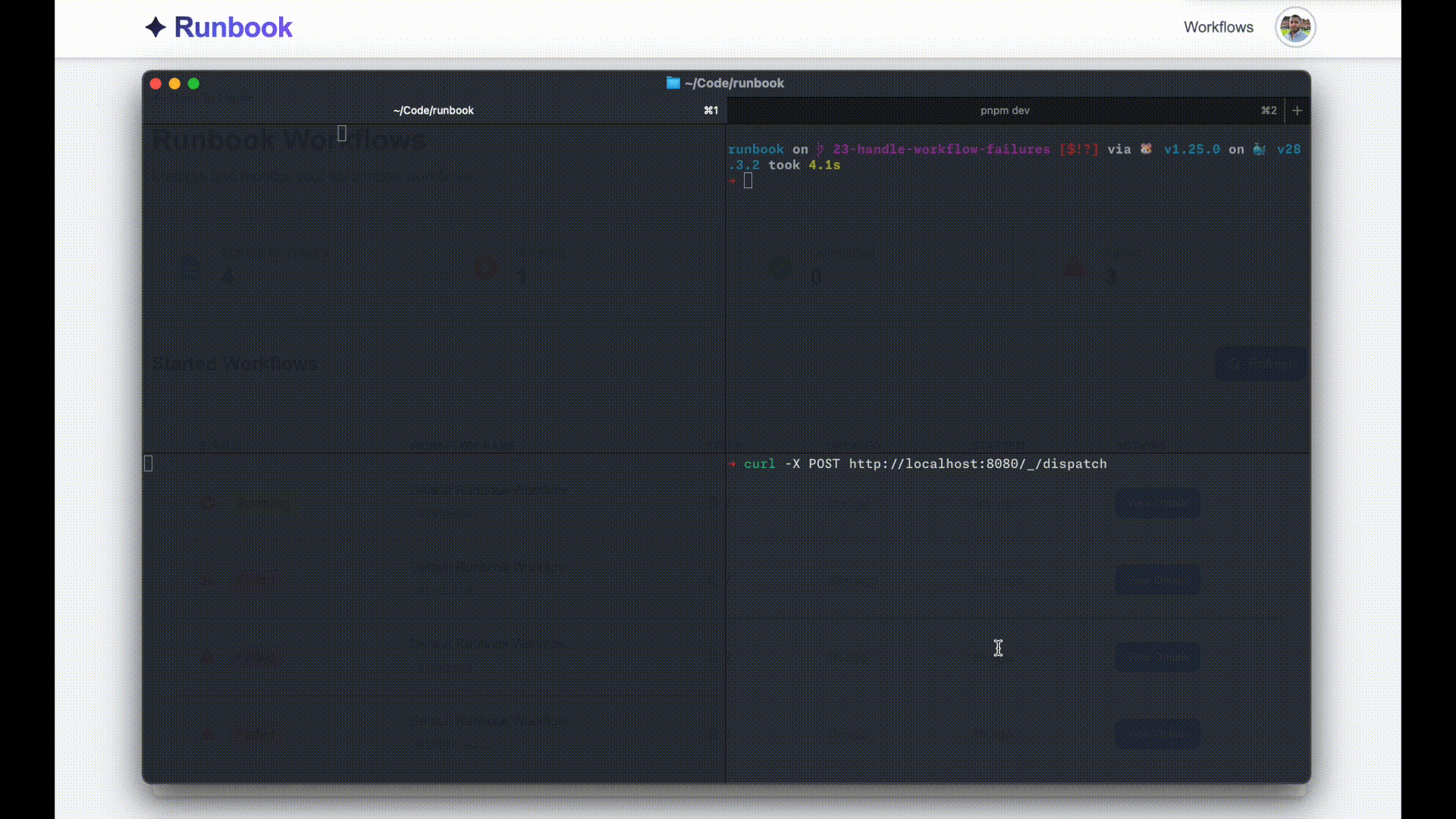Previous notes:
After taking some time off for strolls in Andalusia and dips in Costa del Sol, I’m back to staring at colorful text in a terminal emulator. I found the strength to get back at Runbook, and address an issue I introduced two notes ago. If you can recall, one of the losses in the Gains & Losses section of Note 002, was ”[…losing] the support for Go contexts: a context getting cancelled doesn’t translate into the pod shutting down. At least not automagically.”
This wasn’t a big deal for a while, since I had more important stuff to worry about, but while performing some tests that were expected to fail, being able to stop workflows mid-run was becoming sort of a need. So, after more than a month, I finally addressed graceful shutdowns head-on. Here is a sample run of a workflow that gets triggered by an HTTP event, runs for a while, then it has a sudden stop due to one of its step failing (as expected).

It works in a similar way when a user manually cancells a running workflow, but the video can’t show it because I haven’t added the button in the UI yet. I also can’t show you how I’m cancelling workflows, due to the “My Code My Rules” Policy. What I can show you here, is some niceties in Go.
Error Groups
An error group (errgroup) is basically a context-aware sync.WaitGroup. Like a WaitGroup, it lets you spawn multiple goroutines and wait for them to finish. The difference is that errgroup adds two key features:
- Error propagation – if any goroutine returns an error, the entire group fails.
- Context cancellation – once one goroutine fails, the context passed to the group is cancelled, signaling the rest to stop.
That means you can spin up a bunch of concurrent jobs, and if one of them dies, the rest know they should clean up and exit instead of running blindly or ending up with zombie jobs.
Here’s a simplified example of how I use it:
func SpawnJobs(ctx context.Context, workflow *Workflow) error {
g, gCtx := errgroup.WithContext(ctx)
for _, step := range workflow.Steps {
g.Go(func() error {
job, err := SpawnJobForStep(gCtx, step)
if err != nil {
return fmt.Errorf("something went wrong: %w", err)
}
// block until done
return WaitForStepToFinish(gCtx, job)
})
}
return g.Wait()
}If something goes wrong while SpawnJobForStep() or WaitForStepToFinish(), the gCtx.Done() channel will get closed, so somewhere inside those functions is some code like:
select {
case <- gCtx.Done():
// cleanup
default:
// do stuff
}This pattern is very useful in my orchestrator: workflows can have many steps, and error groups make sure a failure in one propagates to all.
First-class functions
You can pass functions as params to other functions in JavaScript, since JS is a Functional Programming language. Well, you can do the same in Go. You can also do it in C, but let’s not start calling C a FP language now.
You can definitely do FP in C, but y’all ain’t ready for that conversation
I found I had the need to do some arbitrary changes to the global run state: the Redis I’ve been trying to avoid since the beginning, the culprit of the self-deadlock from the previous note. I could put all these changes in functions like this:
func HandleUseCaseA() {
currentState, err := GetState(key)
if err != nil {
return err
}
globalState.m.Lock()
defer globalState.m.Unlock()
// Handle A
}
func HandleUseCaseB() {
currentState, err := GetState(key)
if err != nil {
return err
}
globalState.m.Lock()
defer globalState.m.Unlock()
// Handle B
}And risk reaching HandleUseCaseZZ… But I decided to better “expose” the lock in this way:
func WithLock(key string, fn func(*RunState) error) error {
currentState, err := GetState(key)
if err != nil {
return err
}
globalState.m.Lock()
defer globalState.m.Unlock()
return fn(currentState)
}So, let the caller define how the use case is handled, and the state exposes the lock/unlock logic in a secure way.
In a similar fashion, while this piece of code might not seem related to the workflow cancellation, it is very crucial when it comes to state management. And state management helps me spawn and shut down jobs correctly, so there’s more here than it meets the eye.
Runbook can now shut down gracefully. No more orphaned pods left running when workflows fail or get cancelled. No more wasted resources. Runbook is more reliable than ever.